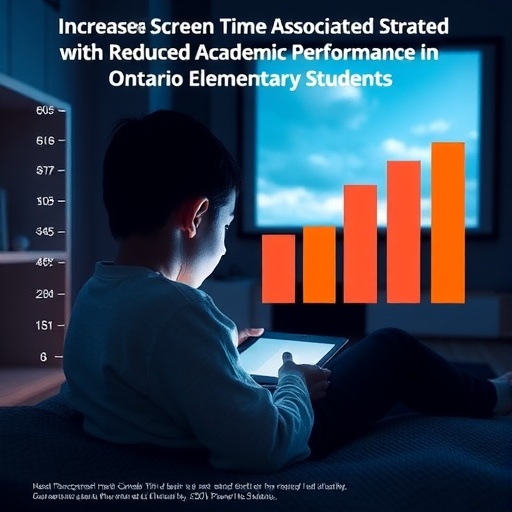In an era where digital screens pervade every aspect of life, a groundbreaking longitudinal study spearheaded by the TARGet Kids! research network sheds critical light on the tangible academic consequences linked to early childhood screen time. The study, recently published in JAMA Network Open, elucidates a compelling association between increased screen exposure and diminished academic performance, specifically in reading and mathematics among young learners in Ontario, Canada. This comprehensive research, coordinated by Dr. Catherine Birken at The Hospital for Sick Children (SickKids) and Dr. Jonathon Maguire at St. Michael’s Hospital, unfolds over a 15-year timeline, involving more than 3,000 children, and marks a significant expansion in understanding how formative digital habits influence educational trajectories.
The investigators utilized an innovative approach by integrating parent-reported screen time data gathered in early childhood with subsequent standardized academic results measured by the Education Quality and Accountability Office (EQAO). The scope of academic assessments spanned Grade 3 reading and mathematics as well as Grade 6 mathematics, delivering a nuanced view of how screen engagement impacts foundational cognitive skills over time. Crucially, the data revealed that every additional hour of daily screen exposure corresponded to a 10% decrease in the odds of achieving higher academic levels, a striking indicator of screen time’s potential to hinder educational attainment.
This pioneering study adds a critical dimension to the growing discourse on screen time by examining not merely total exposure but also the type of digital activity involved. The term ‘screen time’ encompassed television, computer use, and interaction with handheld devices like smartphones, each modality showing correlations with poorer outcomes in reading and math achievement. These findings emphasize the need to move beyond simplistic metrics of screen duration and consider the qualitative aspects of screen engagement that differentially affect children’s educational progress.
Interestingly, when exploring the impact on writing performance, the researchers found a comparatively limited effect, suggesting that screen time’s influence may be domain-specific within academic disciplines. The complex relationship between digital media exposure and cognitive, linguistic, and motor skills necessary for writing tasks perhaps warrants further inquiry, as the study signals the specificity of screen time’s academic repercussions.
Gender differences emerged in the analysis of video game use, with female students exhibiting a stronger link between gaming and lower academic performance in Grade 3 reading and math compared to their male peers. However, video game engagement was relatively uncommon, with only 20% of parents reporting such activities, indicating the need for additional research to clarify the underlying mechanisms and social dynamics at play. These gender-based distinctions highlight the importance of examining screen time through a multifaceted lens that accounts for sociocultural and behavioral variables.
The research team underscored the vital role of early life environments in shaping academic outcomes, advocating for interventions that promote healthy screen habits from a young age. Lead author Xuedi Li, an epidemiologist at SickKids, emphasized that any effective strategies should evaluate not only the quantity but also the quality of screen content, as well as the social context in which children consume digital media—whether in isolation or with the involvement of caregivers and peers. This holistic perspective is essential to crafting nuanced and impactful public health policies.
The study also stands out in its methodological rigor, leveraging linked datasets integrating child health data from TARGet Kids! with EQAO’s standardized test scores. Such linkage enables unprecedented granularity in tracking the longitudinal effects of early experiences on later academic success. It further highlights the power of cross-sector partnerships in producing evidence-based insights that transcend traditional disciplinary boundaries, coalescing pediatric health, education, and epidemiology.
On a methodological note, parent-reported data collection raises inherent challenges such as recall bias and accuracy in estimating screen time, yet the study’s robust sample size and longitudinal design reinforce the validity of its conclusions. By focusing on a representative Ontario cohort over an extended period, the findings provide a critical empirical foundation for future experimental and intervention studies aimed at mitigating adverse educational impacts of screen overuse.
Looking towards the future, the authors express a keen interest in expanding their inquiry to encompass diverse academic indicators beyond standardized test performance, such as school report cards and attendance metrics. They also aim to refine their understanding of how the intersection of screen content, behavioral contexts, and socio-environmental factors interact to mold educational trajectories. This emerging research agenda promises to deepen the scientific community’s grasp on digital media’s multifarious effects.
For families navigating the complexities of digital parenting, these findings reinforce the necessity of balanced, mindful screen use during critical developmental windows. Jennifer Batten, a parent advisor to TARGet Kids!, attested to the research’s resonance, reflecting the real-world challenges parents face in managing their children’s digital ecosystems amid rapid technological change. Such stakeholder engagement underscores the translational potential of scientific inquiry into practical, community-informed solutions.
Funded by the Canadian Institutes of Health Research and the Edwin S.H. Leong Centre for Healthy Children at SickKids and the University of Toronto, this study exemplifies the intersection of rigorous science and social relevance. Its implications reverberate beyond Ontario, offering vital evidence that could inform global educational and public health strategies aimed at fostering cognitive and academic resilience in the digital age.
In summation, this landmark investigation delineates a clear, dose-dependent relationship between early screen time and academic challenges in reading and mathematics, advocating for integrative, age-appropriate interventions. By illuminating the nuanced dynamics between screen exposure, content quality, and social contexts, the research propels the conversation forward. It calls on clinicians, educators, policymakers, and families alike to collaborate in shaping healthier digital futures for the next generation.
Subject of Research: Early childhood screen time and its association with academic achievement in reading and mathematics in Ontario elementary students.
Article Title: Not explicitly provided.
News Publication Date: 10-Oct-2025
Web References:
- JAMA Network Open Article: 10.1001/jamanetworkopen.2025.37092
- TARGet Kids! Research Network: https://www.targetkids.ca/
- Hospital for Sick Children (SickKids): https://www.sickkids.ca/en/staff/b/catherine-birken/
- EQAO: https://www.eqao.com
References: Study published in JAMA Network Open, DOI: 10.1001/jamanetworkopen.2025.37092
Keywords: Education, Children, Educational testing, Achievement gap, Educational attainment




